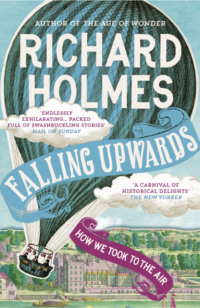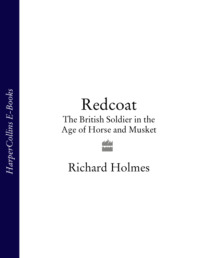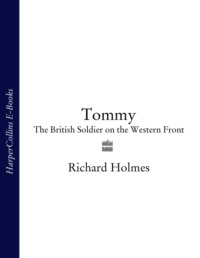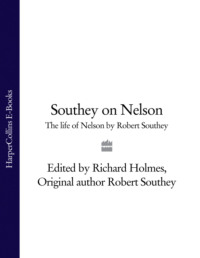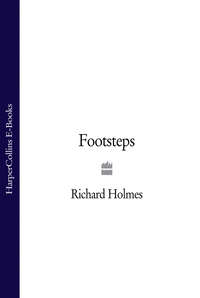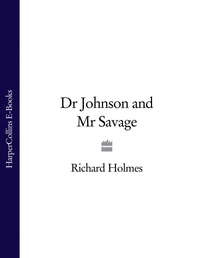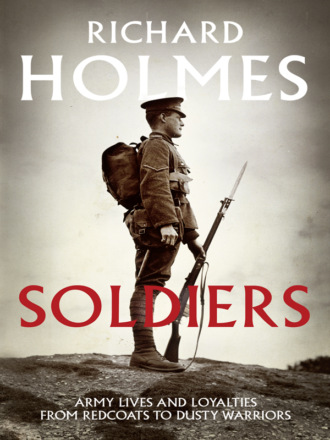
Полная версия
Soldiers: Army Lives and Loyalties from Redcoats to Dusty Warriors
The number of military MPs would have doubtless continued to decline had not the two world wars reversed the trend. Members of both houses volunteered on a huge scale in 1914. Twenty-two MPs died: Arthur O’Neill, Unionist member for Mid-Antrim and a captain in the Life Guards was the first MP to die, at Ypres in 1914. They ranged in rank from lieutenant, with 39-year-old Viscount Quennington (Michael Hicks-Beach MP) dying of wounds in 1916 as a subaltern in the Royal Gloucestershire Hussars, to lieutenant colonel, with Guy Baring (elected for Winchester in 1906 while still a serving officer) killed at the head of his Coldstream battalion on the Somme. In the field, a man’s politics could be ignored. Willie Redmond, an Irish Nationalist MP since 1884, joined the attack on Messines Ridge in 1917 (at 56, he was too old for front line infantry service). Hard hit, he was carried from the field by two Ulster Division stretcher-bearers who disapproved of his politics but would not leave him to die alone.
In volunteering, many MPs turned their backs on the manicured world of old, comfortable Britain. Tommy Agar-Robartes left beautiful Lanhydrock to die at Loos commanding a company of the Coldstream, and William Gladstone, grandson of the grand old man of Victorian liberalism, set off from Hawarden Castle to perish as a lieutenant in the Royal Welch Fusiliers in 1915. Sir Fredrick Cawley of Berrington Hall, Leominster had four sons and of these, three died. One was a regular cavalryman in 1914 and the other two, both MPs, died at Gallipoli in 1915 and the Western Front in August 1918. Sometimes we remember them for oblique reasons. Major Valentine Fleming, member for South Oxfordshire, died at Arras in May 1917 commanding a squadron of the Queen’s Own Oxfordshire Hussars: his son Ian was to be the creator of James Bond.
Distinctions between Commons and Lords are unhelpful, for eleven of the MPs who died were peers’ sons, and some would have gone on to inherit the family peerage. Approximately 1500 members of the 685 peerage families in the United Kingdom served in the war, and 270 were killed or died of wounds.12 The oldest was 82-year-old Field Marshal Earl Roberts, who had won his VC in the Indian Mutiny. He had been the army’s last commander-in-chief and was carried off by pneumonia at St Omer in November 1914, during a visit to Indian troops in France. The youngest was 17-year-old Midshipman the Hon Bernard Bailey, youngest son of Lord Glenusk, who perished when the armoured cruiser HMS Defence blew up at Jutland. His eldest brother fought with the Grenadiers on the Western Front throughout the war, and was commanding a battalion at the war’s end. His second brother, farming in East Africa when war broke out, returned to England at once and the fact that he had been a lance corporal in the Eton College OTC helped him waft into the Grenadiers. He was killed at Givenchy on 10 August 1915, and lies in Guards Cemetery, Windy Corner, not far from Brigadier-General the Hon John Hepburn-Stuart-Forbes-Trefusis, late of the Irish Guards and one of Lord Clinton’s sons, who died two weeks later.
The concentric ripples of family and friendship made the relationship between Westminster and the war even more pervasive. Herbert Asquith, Prime Minister at the start of the war, had four sons. The eldest, Raymond, died with the Grenadiers on the Somme; Herbert served as a gunner officer on the Western Front, and the much-wounded Arthur commanded a brigade of the Royal Naval Division. Anthony, being born in 1902, was too young to serve. All three sons of Labour leader Arthur Henderson fought: the eldest was killed on the Somme, where he lies, with a brisk walk in the lee of Delville Wood between him and Raymond Asquith. Liberal politician Jack Seely, had served in the yeomanry in the Boer War, and been forced to resign as secretary of state for war over the Curragh affair in 1914. He commanded the Canadian Cavalry Brigade on the Western Front, and his son Frank, a second lieutenant in the Hampshires (the family lived on the Isle of Wight and this was the county regiment) was killed at Arras in 1917.
Although the military demand for manpower in the Second World War was much smaller than in the First, twenty-three MPs died on war service, although this includes seven who perished in aircraft crashes, a retired lieutenant colonel who killed himself, fearing that an old wound might prevent his going on active service, and Private Patrick Munro, MP for Llandaff and Barry, who died on a Home Guard training exercise. Sir Arnold Wilson had served in the Indian Army before the First World War, had gone on to become a colonial administrator, and was elected Conservative MP for Hitchin in 1933. The New Statesman thought him ‘an admirer of Hitler’, but when war came he affirmed ‘I have no desire to shelter myself and live in safety behind the bodies of millions of our young men.’ He joined the Royal Air Force Volunteer Reserve as a pilot officer air gunner, and was killed at 56 over France in 1940. John Whiteley, elected MP for Buckingham in 1937, had served as a gunner officer in the First World War, and died as a brigadier when the aircraft carrying General Sikorsky crashed at Gibraltar in 1943. Peers and their children (for women were now conscripted) also served in large numbers, and relationships within the Westminster village meant that, just as had been the case in the First World War, there were intimate links between the two houses. The Hon Richard Wood, third son of the Earl of Halifax, lost both legs but went on to serve as a junior minister in four administrations, and was ennobled as Baron Holderness. He married the daughter of Lieutenant Colonel Edward Orlando ‘Flash’ Kellett, MP for Birmingham Aston, who had been a regular officer before joining the yeomanry: Kellett was killed commanding the Sherwood Rangers in North Africa in 1943.
The cases of Edward Kellett and John Whitely underline the strength of military representation in the parliament of the inter-war years. In 1919, 12 per cent of new Conservative MPs had served in the forces. Between 1919 and 1939, ex-regular officers were, after lawyers, the second largest occupational group in the Commons. There were the very senior: Lieutenant General Sir Aylmer Hunter-Weston was elected Unionist MP for North Ayrshire in a October 1916 by-election while commanding a corps on the Somme. He left the army in 1919, and sat as an MP till 1935. Field Marshal Sir Henry Wilson was elected Unionist MP for North Down in 1921, though he was murdered by Irish nationalists outside his London home the following year. And there were the more junior: Jack Cohen sat for Liverpool Fairfield in 1918–31, and lost both legs at Passchendaele. Ian Fraser, who sat for St Pancras North in 1924–9 and 1931–7, then for Lonsdale in 1940–58, had been commissioned into the King’s Shropshire Light Infantry in time to be blinded on the Somme. He crowned a remarkable career by being ennobled as Baron Fraser of Lonsdale, Britain’s first life peer, in 1958.
Most striking is the close connection between military service and high office. Winston Churchill had fought on the North-West Frontier, at Omdurman and in the Boer War before entering politics. In 1916, widely blamed for the Gallipoli fiasco, he rejoined the army (having maintained his military status by serving in the yeomanry), and was attached to the Grenadier Guards to learn the ways of trench warfare before commanding 6th Royal Scots Fusiliers in the Ploegsteert sector, south of Ypres, for the first five months of 1916.
Churchill’s deputy from 1940 to 1945, and his successor after that year’s general election, was Labour leader Clement Attlee. He had been a lecturer at the London School of Economics when war broke out in 1914, and was immediately commissioned into the South Lancashire Regiment. In 1915 he commanded a company on Gallipoli, and probably owed his life to the fact that he was being treated for dysentery during some very heavy fighting. His company was one of those chosen to furnish the rearguard during the withdrawal from Suvla Bay in December, and he was the last but one man to leave. Attlee was wounded in Mesopotamia, so spent 1917 in Britain, and was then posted to the Western Front for the last six months of the war. In the inter-war years he styled himself ‘Major Attlee’, and his open, collegiate style of leadership reflected the skills needed to command a mixture of wartime volunteers and conscripts in a middle-of-the-road infantry regiment.
Attlee was ousted by Churchill in 1951, and Churchill himself was succeeded in 1955 by Anthony Eden, a classic example of the well-connected officer (Durham landed-gentry, Eton and Oxford) who had a good war. He was commissioned into 21/King’s Royal Rifle Corps, proudly known as the Yeoman Rifles and raised by Charles, Earl of Feversham. The battalion was first committed to battle on the Somme on 15 September 1916; Feversham was killed that day. Eden won the Military Cross, became adjutant of his battalion and finally, aged just 21, became the youngest brigade major (chief of staff of a formation then comprising three infantry battalions) in the army. Styling himself Captain Eden he was elected to parliament in 1923. In 1939 he returned, briefly, to the army as a major. He served as foreign secretary from 1935 to 1938, when he resigned over appeasement. He held important posts during the war, lost one of his two sons in Burma, and again served as foreign secretary for part of Churchill’s second administration. By the time Eden became prime minister he was already past his best, and ended up resigning in 1957 as a result of the Suez affair. There is a strong case for blaming some of Eden’s misfortunes on the strains imposed by two years on the Western Front.
Eden was succeeded by Harold Macmillan, who had served him as both foreign secretary and Chancellor of the Exchequer. A publisher’s son, Macmillan was at Oxford in 1914 and was commissioned into the Grenadier Guards. He was first wounded at Loos in 1915 and had been wounded again by the time he was hit in the pelvis as the Guards Division attacked Guillemont on 15 September 1916. This was the same battle that killed Lieutenant Raymond Asquith and Lieutenant Colonel Guy Baring. Macmillan lay in No Man’s Land reading Aeschylus in Greek, and then spent the rest of the war undergoing a series of operations. Like Eden, he was marked by his experiences. He could not bear to return to Oxford to finish his degree, for he could never forget that of his first-year group at Balliol, only one other had survived the war.
In 1924 he was elected, as Captain Macmillan, for the industrial constituency of Stockton. He lost his seat in 1929, but returned to the Commons in 1931. Like Eden he was scornful of appeasement and appeasers, and his easy but authoritative style made him a natural choice for high office when Churchill came to power. From 1942 to 1945 he was resident minister in the Mediterranean. He took over from Eden in 1957 and served till 1963, assuring the country that ‘You’ve never had it so good.’ Macmillan’s concern for social reform, which put him towards the left of the Conservative party of his day, reflected his contact with ordinary folk in the trenches. ‘They have big hearts, these soldiers,’ he wrote, ‘and it is a very pathetic task to have to read all their letters home. Some of the older men, with wives and families who write every day, have in their style a wonderful simplicity which is almost great literature.’
The pattern was broken by Macmillan’s successor, Sir Alec Douglas-Home, who had contracted spinal tuberculosis in 1938. He was bedridden for the first two years of the war and unfit for service thereafter. Harold Wilson, Labour Prime Minister 1964–70 and 1964–6, had volunteered for service in 1939 but had, very sensibly in view of his first-class economic brain, been directed into the Ministry of Fuel and Power. Edward Heath, Conservative Prime Minister 1970–74, had been commissioned into the Royal Artillery, rose to the rank of lieutenant colonel, and soldiered on part-time with the Honourable Artillery Company after the war.
Martial prime ministers are the tip of the iceberg. Until the 1960s the front benches were packed with men who had fought in the world wars, and, certainly as far as the Conservatives were concerned, having had the proverbial ‘good war’ was almost a sine qua non of political success. But a man’s service record did not determine his political stance. Denis Healey had been at Balliol College, Oxford with Edward Heath (the men remained friends) and was commissioned into the Royal Engineers, serving as military landing officer at Anzio in 1943. He gave a ‘barnstorming and strongly left-wing’ speech, still in uniform, at the 1945 Labour Party Conference. But although he made a massive dent in the traditional Conservative majority at Pudsey and Ottley that year, he was not elected till 1952.
In 1962 it was estimated that 9 per cent of MPs were former regular officers, and that military representation in the Commons was nearly a hundred times greater than in society more broadly.13 Conscription endured till 1962 and, until the sharp cuts of 1967, the Territorial Army was over 100,000 strong: both factors helped maintain military experience in parliament. Margaret Thatcher selected all her secretaries of state for defence from former officers. Michael Heseltine, who held the post in 1983–6 was the least martial. Son of a Second World War lieutenant colonel, Heseltine was called up in 1959 in the dying days of National Service and commissioned into the Welsh Guards. From 1945, serving officers were suspended from duty when they ran for parliament, and were required to retire if elected. Heseltine contested the safe Labour seat of Gower in 1959, and was not required to resume service after his defeat. It was not until the appointment of Malcolm Rifkind in 1992 that this chain was broken. No subsequent secretaries of state for defence have had military service, although John Reid, first-rate minister for the armed forces 1997–9 and secretary of state for defence 2005–6 owed part of his affinity with the military to his family ties, for his father had served in the ranks of the Scots Guards.
The passing from politics of the Second World War generation was underscored by the last of the ‘good war’ Tories. Lord Carrington had been commissioned into the Grenadiers in January 1939, and fought from Normandy into Germany with the Guards Armoured Division where he earned a Military Cross commanding the first tank across the great bridge at Nijmegen. Foreign secretary in 1982, he resigned, with characteristic probity, to acknowledge his department’s failure to predict the Argentine invasion of the Falklands. William Whitelaw, ex-Scots Guards and awarded a Military Cross in Normandy, 1944, held a variety of government appointments. He exercised huge influence over Margaret Thatcher, who made him the first hereditary peer created for eighteen years after her victory in the 1983 election. His resignation in 1987, on grounds of ill-health, deprived her of a major steadying influence.
The Parliament whose life ended with the general election of 2010 contained 43 MPs with military service of some sort. Eighteen were ex-regular army officers, ranging from Michael Mates, sometime lieutenant colonel in the Queen’s Dragoon Guards, to Andrew Mitchell, who had held a ‘gap year commission’ between school and university. There were thirteen Territorials, one of them an ex-regular army officer and another a former member of the RAF; seven former members of the RAF; one of the Royal Navy; one who transferred from the Royal Navy to the Royal Naval Reserve; and another naval reservist. One, Rudi Vis, Labour MP for Finchley and Golders Green, had served in the Dutch Armed Forces in his youth. This constituted 6.6 per cent of a house of 646 members. The breadth of the definitions above, which includes both an MP who served in his university’s Officer Training Corps forty years ago, and another medically discharged after a brief period of regular training, underlines the thinness of real military experience, though at least two of the Territorials have been mobilised for service in Iraq or Afghanistan.
To enable peers and MPs without military service to speak with more knowledge of the armed forces, Sir Neil Thorne, a Conservative MP and Territorial colonel, founded the Armed Forces Parliamentary Scheme (AFPS) in 1987. ‘The whole purpose of the scheme,’ he writes, ‘is to enable Members of all parties to speak in debates on the Armed Forces from a position of experience’.14 The scheme lasts a year, during which participants are expected to spend at least 21 of 30 offered days with the armed forces, selecting the service of their choice. They are initially given status roughly aligning them with majors or their equivalents to enable them to spend time with soldiers, sailors, and airmen, rather than to receive the two-star status normally accorded to MPs visiting military units.15
The AFPS makes it possible for participants to return, ‘at four levels from Major to Brigadier equivalent’. At least one, Dr Julian Lewis, Conservative MP for New Forest East, spent some time at the Royal College of Defence Studies, writing a 10,000-word dissertation that was rated in the top ten for his year. In all about ninety MPs have participated in the scheme. The opinion of serving army officers on its usefulness is divided, with some contributors to the invaluable Army Rumour Service website arguing that anything that brings MPs into closer connection with the services can only do good. The facts that the scheme has flourished despite its lack of official funding, and attracts both peers and MPs who take it very seriously, underline the perceived need to remedy the progressive demilitarisation of parliament.
Political allegiance and holding a senior military position have existed independently of each other at many points in history. Most military and naval MPs still sitting immediately after 1688 were Tories, although they were soon outweighed by Whigs. It was, by then, possible for an officer to be opposed to the government and to enjoy senior command. Major General James Webb won a useful little victory at Wynendaele in 1708, ensuring that a vital convoy got through to Marlborough who was besieging Lille. Webb was a Tory and the Tories were in opposition. His supporters in the Commons at once complained that he had been insufficiently rewarded for the Wynendaele exploit. The credit seemed to have gone to Marlborough’s chief of staff, William Cadogan, who sat in the Whig interest for Woodstock – the town adjacent to Marlborough’s country estate, Blenheim Palace.
Ministers were assailed by those who shook the tree of patronage to get commissions, promotions, and appointments for family, friends, and clients. As time went on, ministers became more reluctant to intervene save where they could do so with probity. The papers of the hard-working William, Viscount Barrington, Whig secretary at war 1755–61 and 1765–78, show how patronage worked in the high eighteenth century. In 1760 George, Duke of Marlborough wrote asking for ‘a troop of Dragoons, or a company [captaincy] in an old regiment for a gentleman whose name is Travell: his father was a very zealous friend to us in the late Oxfordshire election … he may stick some time unless your Lordship will favour him with your interest to get promoted.’16 Marlborough’s insistence on an ‘old’ regiment was intended to ensure that Travell did not get appointed to a junior regiment that would be disbanded at the first opportunity, shoving him off onto half-pay. Barrington failed to oblige the duke, for Francis Travell soldiered on unpromoted, and the 1800 Army List has him as a half-pay lieutenant in the now-disbanded 21st Light Dragoons.
Barrington was unusually scrupulous in refusing to break the army’s rules even when pressed hard. In 1771 he told Lord North, then Prime Minister, that although he valued the influential Scottish Whig Sir Gilbert Eliott just as much as North himself did:
Yet I must not assist you in getting a company for his son.
Two invariable and indispensable rules of the army are that every man shall begin military life with the lowest commission, and that he shall be at least 16 years of age till he shall obtain any …
Mr. Elliot was not I believe ten years of age when he had a commission of lieutenant & soon after he was most irregularly made a captain. At the reduction [disbandment] of the corps, he was not kept on any list, or kept on half pay … What shall I say to the friends of Mr Stuart, or Price, or a great many others if Mr Elliot is a Captain before them? I shall be told with great truth that his former commission is a nullity though it still remains in his possession. The whole world will condemn me, and what is worst of all, I shall condemn myself.17
There was a growing belief that an officer should not be penalised, in his military capacity, for opinions expressed as a Parliamentarian. Yet there were still some serious upsets. William Pitt the Elder was commissioned into Lord Cobham’s Dragoons, with Treasury approval, so that the government could expect the support of his brother, already an MP, and joined his regiment at Northampton. William himself soon became Whig member for that most addled of rotten boroughs, Old Sarum, which had no resident voters at all. He made strident attacks on government policy, causing Prime Minister Robert Walpole, always slow to turn the other cheek, to observe ‘We must muzzle this terrible cornet of horse.’ In 1736 Walpole duly secured the dismissal of Pitt and several other military and naval MPs who had opposed the government. The move was not popular in the house, but none of the dismissed officers was reinstated. In 1764 Lieutenant General Henry Conway, who enjoyed the prestigious colonelcy of the 1st Royal Dragoons, voted against the government and was stripped of his colonelcy. The opposition at once protested that this was military punishment for political offence, and although George III did not restore Conway ‘he never again breached the principle enunciated by Conway’s supporters’, and Conway himself went on to be commander-in-chief.18
By the 1780s it was clear that the espousal of firm political views was not necessarily a bar to either high rank or employment in sensitive posts. Three of the most senior generals in North America, William Howe (C-in-C 1775–78), Henry Clinton (C-in-C 1778–82) and John Burgoyne, who surrendered at Saratoga in 1777, were serving MPs. Both Howe and Burgoyne were Whigs, and had spoken in Parliament against the American war. Howe had assured his Nottingham constituents that he would not serve against the colonists. When he agreed to do so one told him that: ‘I don’t wish you to fall, as many do, but I cannot say I wish success to the undertaking.’ Howe replied that ‘I was ordered, and could not refuse, without incurring the odious name of backwardness to serve my country in distress.’19
The social unrest that followed the Napoleonic wars saw the clearest example of politically-engaged officers attaining high rank despite firmly held opinions. Charles James Napier was a scion of a military family: his father Colonel George Napier and brothers George and William were soldiers, and another brother was a sailor. He earned a brilliant reputation as an infantry officer in the Peninsula. The Napiers were all radicals, and in George senior’s case experience of revolt in America, Ireland, and France had given him much sympathy for the rebels. For Charles, the process owed much to his wide reading while at the Senior Division of the Royal Military College. In 1839 the government appointed him to command Northern District as a major general. It was a courageous choice, for he was known to sympathise with the Chartists, who constituted the greatest threat to the order he was sworn to preserve, to hate the Corn Laws that kept the price of bread artificially high, and to tell the government precisely what its errors were.
Charles Napier was able to distinguish between personal sympathy with the Chartists and professional determination to keep the peace. He was inclined to the view that ‘the best way of treating a country is a good thrashing, followed by great kindness afterwards’, and a notion of responsibility to the Crown rather than its ministers also helped him deal with the inconsistencies in his own position. He made it clear that if the ‘physical force’ Chartists rose, then he would crush them. ‘Poor people! They will suffer’, he wrote. ‘We have the physical force not they … What would their 100,000 men do with my hundred rockets wriggling their fiery tales among them, roaring, scorching, tearing all they came near.’20 This combination of genuine sympathy and absolute firmness made him a notable success in the post.



